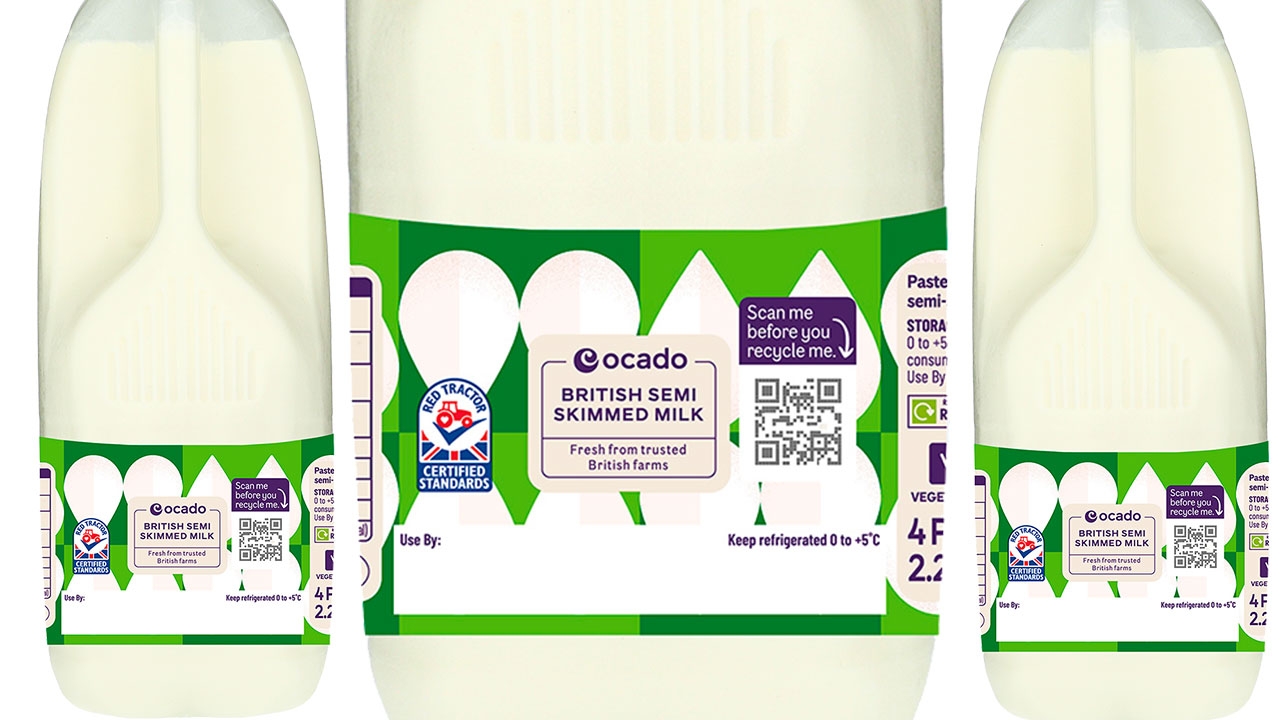Polytag QR codes used in Ocado DDRS trial
Twenty thousand cash rewards redeemed by Ocado Retail customers in first nationwide digital deposit return scheme in the UK.

Over 20,000 cash rewards have been redeemed by consumers as part of the first nationwide digital deposit return scheme (DDRS) trial by one of the major UK supermarket chains Ocado Retail and recycling tech app Bower, utilizing QR codes provided by recycling tech firm, Polytag.
Since 14 July, Ocado Retail customers have been able to claim monetary rewards for recycling any of its own-brand two and four-pint milk bottles using Polytag’s unique QR codes, redeemable via recycling app Bower.
As revealed in an end-of-trial report, the trial saw more than 20,000 Ocado Retail milk bottles scanned by over 3,000 consumers using their smartphones before being deposited into home kerbside recycling.
Held across England and Wales, the world-first initiative enabled monetary rewards and charity donations to be claimed through the Bower app, in which customers simply set up their account and add their regular recycling bins and bank account.
The QR code integrated onto the milk bottles’ labelling is scanned via the app, the bottle disposed of in their registered at-home recycling bin, and the reward withdrawn into their bank account. Up to GBP 4,000 worth of rewards were obtained during the nine-week-long trial.
The trial seeks to meet customers' appetite for retailers to offer recycling initiatives and improve national recycling rates ahead of the government’s DRS scheme set to come into place in 2025.
Polytag, the recycling tech expert and connected packaging solutions provider is proposing a digital approach that offers more convenience, efficiency and accessibility to consumers.
The DRS model as it stands has been widely considered a topic of controversy as consumers and industries debate the financial and logistical implications that reverse vending machines (RVMs) may present.
Polytag is taking a holistic approach to the scheme, offering customers a digital option with its GS1 approved, unique-every-time QR codes that are seamlessly integrated onto packaging labels at printing point.
Invisible UV tags are also applied to the labels enabling tracking and tracing back to dedicated recycling centers and offering brands and retailers unprecedented insights into the whereabouts of their products and packaging.

Customer surveys released by Ocado Retail and Bower at the end of the trial revealed 93 percent of the pilot users feel ‘positively’ towards the idea of a DDRS in the UK and 71 per cent of Ocado Retail’s customers said they would be happy to use a QR code to claim a deposit back, while only 58 percent of respondents showed interest in using a reverse vending machine (RVM).
Alice Rackley, CEO of Polytag, commented: ‘In a world-first initiative with Ocado Retail, we’ve seen the reality of a nationwide DDRS come to realization. Through cutting edge technology and end-to-end packaging solutions, this project has delivered on what consumers have been asking for. A nationwide, scalable, and viable solution to the recycling crisis that keeps convenience and efficiency in mind.

‘Today’s outcome is the result of years of public consultation, technological innovation, and stringent testing working to feed the appetite of consumers for retailers to offer real incentives for recycling. We’re proud to have made this significant mark on the journey to a circular economy and will continue to work closely with our partner brands and retailers to ensure a solution is found that is accessible to all.’
Laura Fernandez, senior packaging and sustainability manager at Ocado Retail, added: ‘We're delighted that over 20,000 Ocado milk bottles were scanned by more than 3,000 customers as part of our digital deposit return scheme trial! To be able to launch a workable DDRS that actually pays customers back for recycling is a game-changing move for recycling and the circular economy in the UK.’
Suwar Mert, CEO and founder of Bower, said: This pilot underscores the strong desire among consumers to receive rewards for their recycling efforts. The response from consumers has been overwhelmingly positive, with widespread enthusiasm for the concept, rapid adoption of the technology, and users recycling an average of 7.5 bottles each. This demonstrates that leveraging existing kerbside recycling infrastructure and people's accessibility to mobile phones provides a scalable and readily deployable solution to significantly increase recycling rates.’
Stay up to date
Subscribe to the free Label News newsletter and receive the latest content every week. We'll never share your email address.

